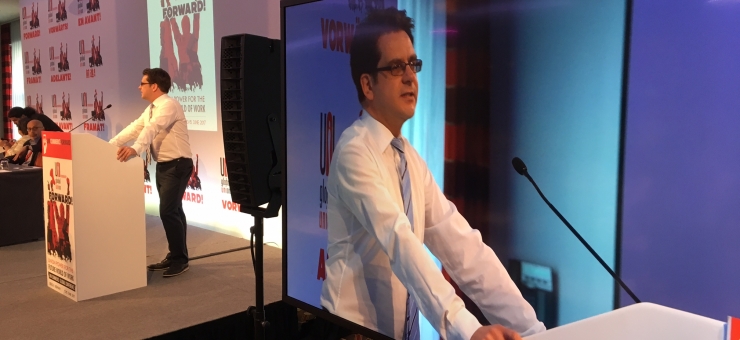Call for a just transition in the Future World of Work

Thorben Albrecht, Permanent State Secretary, German Labour Ministry picked up on the theme of a just transition in the Future World of Work when addressing the UNI Commerce Global Conference in Berlin.
Albrecht said the key question was how did we want to work in the future? He said that was the question being raised in Germany by the ‘Work 4.0’ programme:
“The needs and values of the worker have to be put first and that means decent, quality, well-paid. quality work. The future of work must be human-centered where we use digital tools and don’t become appendages to algorithms that track us around the shopfloor.
“We must shape digital workplaces and stay optimistic but wary and not naïve. We have to create these workplaces through discussion, negotiation and where necessary by resolving conflict.”
Albrecht warned that the digital revolution threatened to hollow out the ‘middle class’ jobs where workers would need upskilling and reskilling. Workers in lower paid jobs would also need to be upskilled. He said the onus was on companies to invest in skills in the workplace and for work councils to have the resources and expertise to make sure all workers can participate.
Albrecht said that it was crucial to find a just transition between the old and new work, suggesting for example that rather than the state only providing unemployment benefits it would be better to invest in workers before they lost their jobs to help them re-train.
Albrecht was clear that fight against bogus self-employment was paramount:
“There is a big difference between an entrepreneur setting up a small computer company and van or taxi drivers with no rights or pension. It’s not impossible in Germany we have laws which prevent the Uber model.
Similarly, digital platforms owed responsibilities to crowd workers as employers. In Germany, we have a ‘home work’ law for textile workers aimed at protecting the rights of seamstresses working from home. There is no reason why a similar law could not be applied to crowd workers.”
Albrecht said that many of the answers rested with traditional solutions: collective bargaining, freedom to negotiate and organising.
“In Germany these rights are written into our law but still sometimes abused where there are no effective work councils. We need to step forward on this and do more.”
Rounding off his remarks, Albrecht said that national law must be applied to platforms who’s head offices are based elsewhere such as Silicon Valley if they were operating within that country. Similarly ways had to be found to disclose tax loop-holes that allowed avoidance despite the revenue being created within those national borders.

